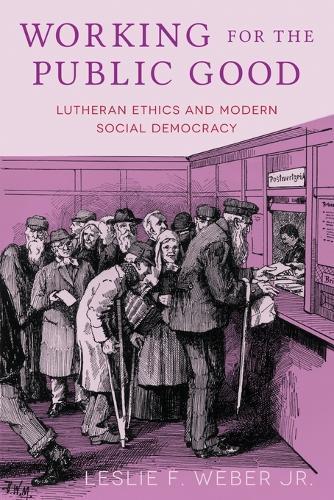Full Product Details
Author: Leslie F. Weber, Jr.
Publisher: Augsburg Fortress Publishers
Imprint: Fortress Press,U.S.
Weight: 0.318kg
ISBN: 9798889832911
Pages: 757
Publication Date: 21 October 2025
Audience:
Professional and scholarly
,
Professional & Vocational
Format: Paperback
Publisher's Status: Active
Availability: Manufactured on demand

We will order this item for you from a manufactured on demand supplier.
Reviews
Grounded in a magisterial tracing of Lutheran history and theology, this work by Leslie Weber insists that we look at the very non-quietist way Lutheran social ethics were embodied in institutions of public welfare in Germany and Scandinavia. With the insight of a sociologist and the heart of a pastor, Weber shows us what that history can tell us about how people of faith in the US today can mobilize for the good of the world. --Nancy Ammerman, professor emerita, sociology of religion, Boston University In this informative and expansive study, Leslie F. Weber Jr. provides a sweeping overview, ranging from the sixteenth to the twenty-first century, of the diverse contributions the Lutheran heritage made to the articulation of theologically informed social-reform theories, the formulation of public policies, the establishment of social-welfare institutions, and the implementation of ecclesiastical and governmental programs that addressed specific societal needs. Weber explores the extensive scholarly literature with care and offers corrections and nuances when necessary. Theological, historical, and sociological insights inform the story he recounts and the interpretative insights he offers. The volume serves as an informed corrective to the critique that Lutherans have manifested an inclination toward social quietism and provides extensive evidence of the significant and persistent contributions of Lutheranism to the quest for the common good and the emergence of social democracy in the European countries where this Christian tradition was a formative one. --Kurt K. Hendel, Bernard, Fischer, Westberg Distinguished Ministry Professor Emeritus of Reformation History, Lutheran School of Theology at Chicago Weber demonstrates how Luther's fierce critiques of bankers, courtiers, and any others who exploited the less fortunate, along with his advocacy of the community's care for the ill and the poor, have found echoes throughout five centuries of Lutheran proclamation and practice. Weber's careful historical review and his engagement with interpretations that obscure Luther's broad understanding of love for the neighbor construct a firm basis for his argument for continuing the Lutheran call to reject the individualism and materialism of Western societies today and to put loving neighbors as we love ourselves into concrete practice. --Robert Kolb, professor of systematic theology emeritus, Concordia Seminary Leslie F. Weber presents four centuries of Lutheran social engagement in Northern Europe with impressive historical detail, careful sociological analysis, and theological insight. He offers new perspectives both on central Lutheran teaching and on Lutherans' action in changing social and political circumstances. As he sets out to do, he effectively rebuts charges of Lutheran quietism. --L. DeAne Lagerquist, professor emerita of religion, Harold J. Ditmanson Chair, St. Olaf College In this definitive study, Leslie F. Weber Jr. combines insightful historical research with a career devoted to the church's social teaching to demonstrate the penetration of Reformation teaching into the fabric of German and Scandinavian societies. Refuting the thesis of Troeltsch about Lutheran quietism, this book documents the manifold ways Reformation theology--especially Luther's Two Governances (kingdoms)--gave rise to responsibility for the common good. Across the centuries, the teachings and practices of the Reformers generated impetus for charity and social justice, leading eventually to welfare states that function best as democracies, where citizens are free to participate in the spirit of a universal priesthood. --Craig L. Nessan, William D. Streng Professor for the Education and Renewal of the Church, and professor of contextual theology and ethics, Wartburg Theological Seminary
Author Information
Leslie F. Weber Jr. is a pastor in the Evangelical Lutheran Church in America who served as a parish pastor, school chaplain and teacher, and associate executive director of the Church in Society unit of the ELCA. He holds degrees from Concordia Theological Seminary, Christ Seminary-Seminex, and Emory University. Weber has been active in the Society for the Scientific Study of Religion and the Lutheran Historical Conference.



